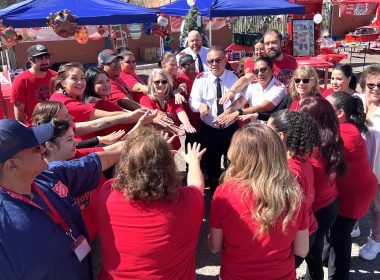Body Builder
by Terry Camsey, Major –
Well, Christmas is once again a memory and many may, like me find themselves in the New Year looking back and assessing the past twelve months. It’s a nostalgic exercise filled with joys and sorrows, births and deaths, “wouldas”, “couldas” and “shouldas!”
Since we retired, the annual retired officers’ Christmas party has been a significant yearly milestone where we greet new retirees, remember those who have passed on since last we met in this way, and enjoy catching up with the news from those we have not seen for several months.
The most recent such event was particularly nostalgic for me. Lt. Colonel Diane O’Brien had assembled a small vocal ensemble who presented several items including a Christmas carol I had written in my youth. The singing of that carol was all that any vocal music aficionado could wish for—balance, blend, diction, dynamics—all were exquisite.
As they sang I recalled the circumstances of its birth. The music came first to me. I passed the music to Donald Weekes, the young people’s sergeant major at my home corps, and within days he had written the words. It became the first composition I ever had published and appeared in New Songs for Young People in 1957.
As I listened, I found it incredible to believe that the carol is now 50 years old. I wondered where all the years have gone. It has been a very full, interesting, life that treated me well until I had bypass surgery over 20 years ago and has treated me even better since. It was that event that led me (on my way into surgery) to question what I had done for the kingdom that had actually cost me anything. A response to that question led me into officership and a ministry and mission I could never have dreamed of.
That call has not diminished since I have retired. Rather, the Lord is calling me to even greater challenges. My vision is to see the Army as evangelically effective today and in the future, as it was when William Booth—having birthed the movement in 1865—was inspired to change its name in 1878 and in the years immediately following saw significant growth.
I recently came across some words of Winston Churchill that I have never seen before. He said this: “The further backward you look, the further forward you can see!” It sounds like an oxymoron until you think about it. Yet, looking back to our early beginnings does provide keys to our future. The challenge, however (as one writer has said and I paraphrase), is getting beyond the immediate past to the long ago past.
And I am not talking about looking at what Booth did in his day, so much as determining why he did those things. What—with each activity or program—was he striving to achieve? That in turn leads us to other questions: ”Are those methods effective in his day as effective today?” If not, “Can they be made more effective?” And, if they cannot, “In what other ways can we accomplish what Booth was trying to do?
We have to ask whether we spin our wheels expending valuable, yet increasingly limited, energy on things that do not move us in the direction we ought and need to go. Can we afford to do so?
The harder you bounce a ball, the higher it will fly. The harder and closer we look at the early days of the Army, the more we can learn that can propel us effectively into the future. But it will be found more in the spirit of the age than in its strategy.
Nostalgia must be tempered by wisdom. “What you see,” they say, “is what you get!”
Is our eyesight 20/20 or do cataracts cloud our vision?
That remains to be seen, wouldn’t you say?











